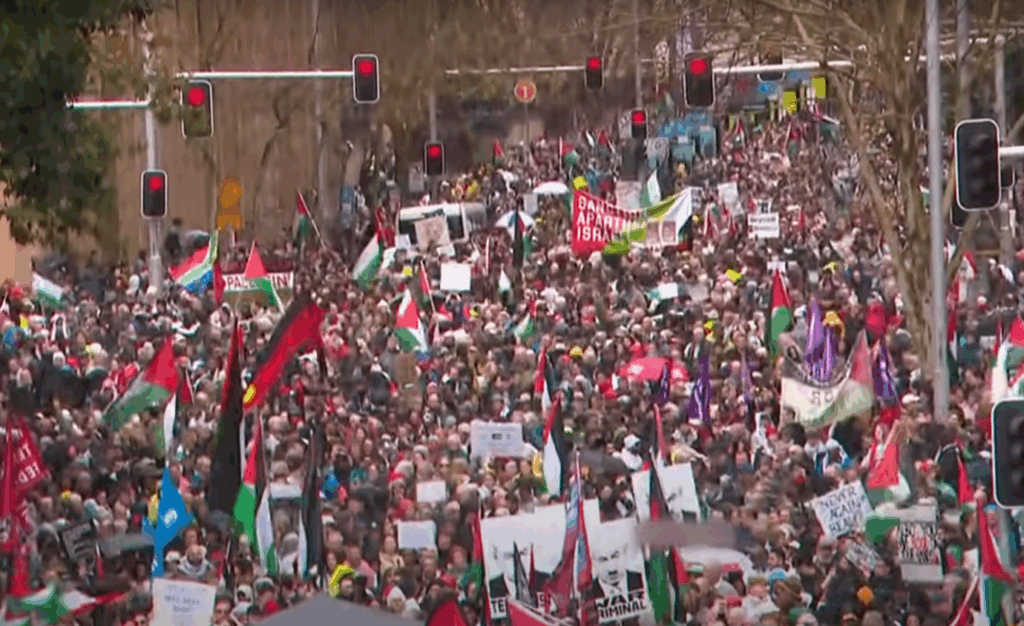NSW Shadow Attorney‑General Alister Henskens SC MP has introduced a private member’s bill that would restrict any advocacy group from holding more than three protests without being charged.
If passed, it would entrench political privilege, handing even more power to those who already have direct access through wealth, connections, and paid lobbyists, while silencing everyday Australians who depend on protest as their only means of being heard.
Let’s be clear: this idea of charging people to protest, or worse, punishing those who protest more than three times, isn’t about managing disruption. It’s about managing dissent. And worse, it’s about putting a dollar value on democracy.
It sends a blunt message to the public: you want a voice? Better have deep pockets. If not, sit down and be quiet.
This is elitism in its purest form, where your ability to speak out is directly tied to your financial capacity. Where lobbying is protected because it’s wrapped in a suit and paid for with political donations, but public protest is vilified because it comes from the street, the grassroots, the unpolished, and often the unheard.
Let’s unpack the claim that repeated protests cause “too much disruption” to everyday life. The real question is: disruption for whom? Because the same people making these arguments seem perfectly fine with road closures for billion-dollar sporting events or traffic blocks for visiting dignitaries. When the disruption benefits the powerful, it’s permitted, even celebrated.
So why is it unacceptable when it’s working-class Australians, students, parents, or communities demanding justice? Because they don’t come with a cheque book and a lobbyist attached.
And if the argument is truly about “disruption”, then why does the solution become acceptable if someone simply pays a fee? Are we now commodifying civil rights? If you can afford the cost, your protest is tolerated. If you can’t, you’re criminalised.
That’s not law and order. That’s pay-to-play democracy.
The truth is, protest is the result of a broken system, not the cause of it. People don’t take to the streets because they want to be there. They do it because their MPs won’t meet with them. Because their letters go unanswered. Because public hearings are stacked with pre-approved stakeholders. Because lobbyists get more time with ministers than constituents do.
And here’s the part that’s even more infuriating: our taxes already fund the operations of Parliament, the salaries of elected officials, and the machinery of government that often refuses to listen to us.
Protest is the people’s last resort. It’s the safety valve of democracy. When that’s under threat, so is everything else.
We need transparency, not tyranny. If we’re going to have a conversation about protest and influence, then let’s have a real one.
Let’s talk about who gets access to power, and who doesn’t. Let’s talk about the money flowing into political campaigns and what’s expected in return. Let’s talk about the lobbyists with unlimited access and the everyday citizens blocked by red tape.
In fact, let’s go one step further. There should be a public dashboard for every MP showing:
- Who they meet with (and how often)
- Who donates to them
- What industries they’re engaging with
- Who’s calling their office, and getting a call back
If politicians are paid by the public, they should be accountable to the public. Not just the most influential voice in the room with a cheque book.
You don’t have to agree with a protest to support the right to protest.
That’s the deal in a democracy. You don’t have to like the issue. You don’t have to join the march. You just have to respect that others have a right to be heard, even when it’s uncomfortable, inconvenient, or unpopular.
That’s what separates us from authoritarian regimes where dissent is outlawed, and silence is bought.
We saw during the COVID-19 lockdowns what happens when governments stop listening. We were told to stay quiet “for the greater good” while decisions were made without community consultation. And now, they want to formalise that silence, with penalties, restrictions, and fines for being too loud too often.
That’s not safety. That’s suppression.
Protest is not a luxury. It’s a right. Once you start putting a price on protest, you’re declaring that only the rich deserve to have their voices heard. That justice and equality are reserved for those who can afford them. That democracy can be bought and sold. We should all be worried about that. Because today it might be a protest you disagree with. But tomorrow, it might be your voice they want to price out of existence.
Support Women’s Agenda! We are 100% independent and women-owned. We’re covering the Federal Election from the perspective of what matters to women, and always keeping the issues that matter for women on the daily agenda. Foundation memberships are just $5 a month.
Bonus: you’ll receive our weekly editor’s wrap of the key stories to know every Saturday.


